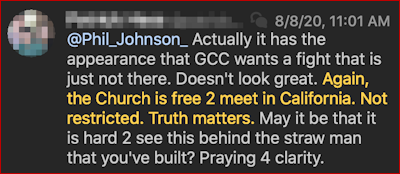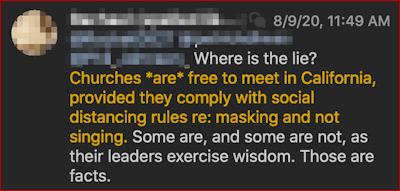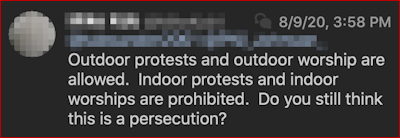by Phil Johnson
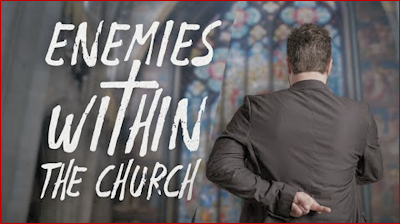
 finally had an opportunity to see the documentary "Enemies Within the Church," and as promised, here is a candid review:
finally had an opportunity to see the documentary "Enemies Within the Church," and as promised, here is a candid review:
The Good
You need to watch this documentary. Its central message sounds a clear and necessary alarm that today's evangelicals (leaders and lay persons alike) urgently need to hear and heed. It is a two-hour video presenting undeniable evidence that influential forces within the church have been (and still are) working hard to advance an agenda that is rooted in neo-Marxism, overlaid with identity politics, and peppered with postmodern jargon. In other words, countless Christians are being force-fed an ideology that comes from the world, not from Scripture. It is being pushed in our seminaries and churches with tactics (and a lot of financing) taken from secular left-wing sources.
The worldview and values these change-agents promote are clearly influenced by radical feminism, the sexual revolution, academic elitism, socialist tenets, and critical theory. Those who traffic in these ideas don't necessarily sound overtly hostile to the authority of Scripture. Instead, they subtly undermine moral principles, vital doctrines, and the gospel itself. They subvert historic evangelical convictions by lobbying for Woke doctrines and liberal trends while relentlessly warning evangelicals that the church will lose the next generation, maybe even die, if we don't stay in step with the drift of the secular intelligentsia.
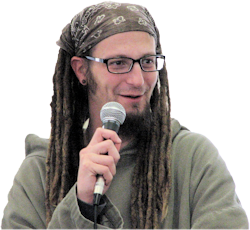 This is by no means a new phenomenon. There is an easily traceable line of descent that runs from the Socinians of the 16th and 17th centuries through the Deists and Unitarians of the 18th century, the modernists of the 19th century, the liberals and pragmatists of the 20th century, and the Emergents of the 21st century. Today's Wokevangelicals are following identical lines of argument, employing similar rhetoric, and drifting in the same direction as all of those previous departures from evangelical orthodoxy.
This is by no means a new phenomenon. There is an easily traceable line of descent that runs from the Socinians of the 16th and 17th centuries through the Deists and Unitarians of the 18th century, the modernists of the 19th century, the liberals and pragmatists of the 20th century, and the Emergents of the 21st century. Today's Wokevangelicals are following identical lines of argument, employing similar rhetoric, and drifting in the same direction as all of those previous departures from evangelical orthodoxy.
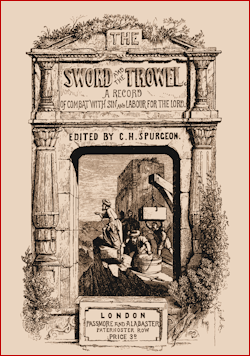 In 1887, The Sword and the Trowel (Charles Spurgeon's monthly journal) published two articles titled "The Down Grade," by Robert Schindler. A fierce polemical war ensued and lasted for several years, known as "The Downgrade Controversy." Anyone who has read about Spurgeon's final years of ministry knows of this controversy. Spurgeon himself and most who were close to him believed the stress of fighting the Downgrade hastened his death. He died less than five years after publishing Schindler's articles.
In 1887, The Sword and the Trowel (Charles Spurgeon's monthly journal) published two articles titled "The Down Grade," by Robert Schindler. A fierce polemical war ensued and lasted for several years, known as "The Downgrade Controversy." Anyone who has read about Spurgeon's final years of ministry knows of this controversy. Spurgeon himself and most who were close to him believed the stress of fighting the Downgrade hastened his death. He died less than five years after publishing Schindler's articles.
Robert Schindler's (and Spurgeon's) whole point was that the path of liberal apostasy is well-worn and familiar, and it should therefore be obvious to any vigilant observer when a church, educational institution, denomination, or Christian leader starts down that path. As the title suggests, Schindler noted that it's a steep downhill path, so once any person or group takes that turnoff, it becomes nearly impossible to stop the movement downhill.
Schindler was warning against the modernist influence that infected the Baptist Union in Victorian England, but his words are totally applicable to the current drift of Wokevangelicalism.
Be forewarned: "Enemies Within the Church"—like those 1887 articles in The Sword and the Trowel—will be deeply controversial. Sadly, many believers will conclude that the controversial nature of the documentary basically nullifies its message. After all, aren't Christians supposed to love one another? How can we warn against the influence of fellow church members and not be guilty of divisiveness?
But the New Testament is full of admonitions to be on guard against destructive influences within the church. These are wolves in sheep's clothing (Matt. 7:15)—"fierce wolves [that] will come in among you, not sparing the flock; and from among your own selves will arise men speaking twisted things, to draw away the disciples after them" (Acts 20:29-30). We are commanded to "to contend for the faith that was once for all delivered to the saints" (Jude 3)—especially against those who want to rewrite the faith anew for each generation.
This documentary does a superb job in that task, and for that reason I commend it. The cinematography is stunning. The editing is superb. The story is told in a clear and compelling way. The message is poignant. Overall, I give the production high marks, and I hope it gains a large audience.
The Bad
I should, however, mention that I have a few minor theological quibbles. The narrator (Cary Gordon) and several of the featured faces seem to be from Wesleyan backgrounds. That's not my complaint (though I'm a Calvinist). If there was any overt Arminianism in the presentation, I didn't notice it. On the whole, they did a fine job.
But at times speakers mentioned points of doctrine that I thought should have been presented with greater care, or omitted completely. For example, around 47:40, one of the interviewees mentioned John 1:14, "The Word became flesh and dwelt among us."
Pastor Gordon replies, "That means the Old Testament was made flesh in Jesus Christ."
"Yup," says the interviewee.
Pastor Gordon continues: "So if we're to vilify the Old Testament and say we don't need it anymore, we're talking about some part of Jesus."
"No!" I say out loud. That's not what the apostle John is saying. The expression "the Word" throughout John 1 is a reference to Christ in his eternal glory, not the Old Testament. I share Pastor Gordon's contempt for the idea that Christians don't need the Old Testament, but it's not necessary make that point by getting sloppy with our exegesis of John's gospel.
Still, that's a disagreement that doesn't materially affect my endorsement of the film. It doesn't alter or diminish the validity of the larger central message.
A bigger objection of mine would be the way the documentary deals with the Ten Commandments. Here again, I agree with the point the documentary apparently wants to make, but I'm not completely satisfied with how they make it.
Here's the part I agree with: Postmodern evangelicals do overemphasize the love of God and deliberately truncate what Scripture says about sin, righteousness, and judgment—to the point where most in the evangelical movement today seem to think the whole gospel message is that God is love, or that God loves you in particular. The documentary correctly points out that we have not preached the gospel at all if we don't deal with the problem of sin and call unbelievers to repentance (Acts 17:30).
(I also agree that anyone who says the Ten Commandments have no relevance for Christians is an antinomian. And when you try to syncretize Wokeism with evangelicalism, antinomianism is one of the inevitable, and spiritually deadly, results.)
Nevertheless, I wish the documentary had taken greater pains to make clear that the Ten Commandments are not the gospel, or even part of the gospel. They are a prelude to the gospel—a tutor that points us toward Christ and the gospel (Gal. 3:24). The gospel itself is a message about the work of Christ to liberate us from the bondage of sin and the condemnation of the law. The heart of the gospel is the doctrine of justification by faith—not the Ten Commandments.
I'll mention just one other nagging complaint: I think what the documentary says about pietism vs. political activism seems to imply that these are the only two options in a fairly well-defined either/or choice for Christians. But lots of godly, biblically astute, reasonable Christians are neither pietists nor political Zealots. They recognize that churches tend to lose their focus and sometimes even cease preaching the gospel when they become immersed in unbridled political activism.
The true remedy for what ails both the evangelical movement and secular culture is not something that can imposed by legislation. Nor can righteousness be achieved by Christians flexing their collective political clout. "If a law had been given that could give life, then righteousness would indeed be by the law" (Gal. 3:21). Dominionism is a corruption of the church's true agenda (Matt. 20:25-26). The disciples, not the party of the Zealots, are our role models in seeking to turn the world upside down.
The Ugly
Now, if you've seen the online chatter surrounding the release of this documentary, you may be aware that there's a noisy squad of smart-alecky Zealots who began badgering a list of conservative Christian leaders who had previously spoken out against the influence of Wokeism. The Zealots demanded endorsements for this documentary almost as soon as it appeared in a downloadable format. Their nagging quickly turned to ugly public taunts and accusations.
I don't believe the documentary's producers were directly involved in or keenly aware of that campaign of harrassment. In fact, Judd Saul, the project's director, responded graciously to all the noise by making sure I had a speedy opportunity to see the full documentary. I would have eventually watched it anyway and most likely posted a recommendation, but I appreciate Judd's efforts to link me up with a timely review copy.
 Still, those unauthorized efforts to promote the film by browbeating men in Christian leadership have prompted me to say once again that nothing undermines biblical discernment and the cause of truth more deeply and hurtfully than haughty controversialists who act like they firmly believe they are the kingpins and custodians of the cosmic war against false teaching. They seem to think the truth is best advanced by intimidation, insults, crass language, and caustic rhetoric. Passages like 1 Corinthians 13:4-7; Galatians 5:22-23; and 2 Timothy 2:24-25 have no obvious impact on their dealings with others—because as they will point out, undiscerning people misuse those texts to justify their refusal to contend for the faith. But that doesn't give spiritual warriors license to ignore those features of true Christlikeness altogether.
Still, those unauthorized efforts to promote the film by browbeating men in Christian leadership have prompted me to say once again that nothing undermines biblical discernment and the cause of truth more deeply and hurtfully than haughty controversialists who act like they firmly believe they are the kingpins and custodians of the cosmic war against false teaching. They seem to think the truth is best advanced by intimidation, insults, crass language, and caustic rhetoric. Passages like 1 Corinthians 13:4-7; Galatians 5:22-23; and 2 Timothy 2:24-25 have no obvious impact on their dealings with others—because as they will point out, undiscerning people misuse those texts to justify their refusal to contend for the faith. But that doesn't give spiritual warriors license to ignore those features of true Christlikeness altogether.
My counsel: Beware of anyone who treats captiousness as sport. Frankly, such people actually undermine the cause of truth, and in their own way, they can be just as dangerous to the spiritual health of the church as the out-and-out Marxists.
One Final Thing
Virtually all the negative pushback I have seen aimed at "Enemies Within the Church" has come from Southern Baptist sources. The Conservative Baptist Network promoted the film and announced that they would host the premier on the campus of Mid-America Baptist Theological Seminary. The President of Southwestern Baptist Theological Seminary protested the showing and Tweeted an open letter expressing with "deep disappointment but strong conviction," a charge that the documentary contains "scandalous and scurrilous slander."
What about that claim? What is the right response to those who claim the documentary is slanderous?
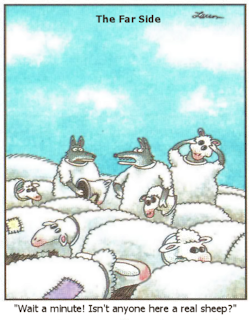 Let me speak plainly: I don't have the time or the need to investigate and verify every individual claim made in the documentary. "Enemies Within the Church" echoes an opinion I have stated many times already, so yes I emphatically agree with the central message. Most of the claims made are either well-established facts, or they are sufficiently documented in the film itself with video records and direct quotations. Plus, the clear and persuasive testimony of multiple eyewitnesses is hard to gainsay.
Let me speak plainly: I don't have the time or the need to investigate and verify every individual claim made in the documentary. "Enemies Within the Church" echoes an opinion I have stated many times already, so yes I emphatically agree with the central message. Most of the claims made are either well-established facts, or they are sufficiently documented in the film itself with video records and direct quotations. Plus, the clear and persuasive testimony of multiple eyewitnesses is hard to gainsay.
So the documentary raises questions that need to be answered. It points out issues that need to be addressed. It highlights problems that need to be corrected. To single out a disputed claim or two and blow the whole thing off as "slander" would be a monumental mistake. Deconstructing the critics' concerns by splitting hairs over terminology or by denying that Critical Race Theory (CRT) has infiltrated Baptist seminaries is not an adequate answer to the concerns raised in this documentary. We've all seen the videos where Baptist seminary professors do parrot rhetoric from CRT sources. The concerns raised by this film cannot be sidestepped or pushed aside. They must be answered.
For the record, I didn't notice any factual claims in the documentary that struck me as questionable. Some statements were made that I would like to see thoroughly documented. For example, a critic might claim that some of the connections drawn between various people and organizations may or may not be more tenuous than the narration noted.
However, it would be ludicrous for any biblically minded believer to deny that large-movement evangelicalism is speeding quickly in a bad direction; that some of the very best leaders in key evangelical institutions do not appear to be trying very hard (if at all) to reverse the drift; and that many other key leaders are aggressively promoting wokeism, identity politics, and other ideas that clearly obscure the straightforward simplicity of the gospel. Those are all legitimate—and weighty—concerns.
In the 1970s, all conservative evangelicals regarded the Sojourners organization as a left-wing outlier and a threat to orthodoxy because of the socialist and radical political agenda they were pushing. Today that point of view is considered mainstream in the larger evangelical movement. Such a profound shift does raise vital questions (or should I say "serious doubts"?) about whether we are truly together for the same gospel.
"Enemies Within the Church" demands a careful inquiry and answers to those questions.


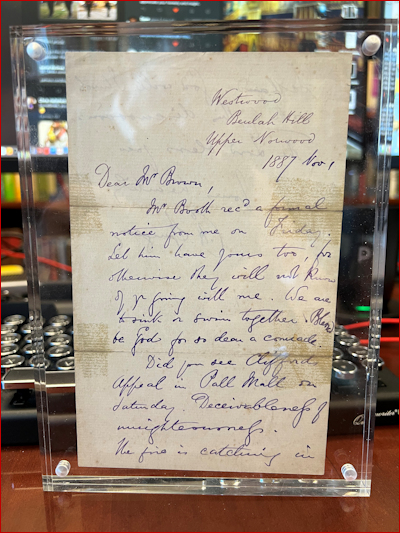
 n October 28, 1887 (a Friday)—well into the Down Grade controversy—Charles Spurgeon wrote the Secretary of the Baptist union to withdraw his membership in the Union.
n October 28, 1887 (a Friday)—well into the Down Grade controversy—Charles Spurgeon wrote the Secretary of the Baptist union to withdraw his membership in the Union.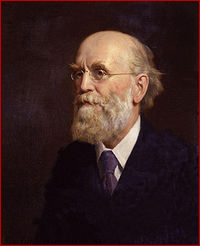 "Clifford" is John Clifford, who had written an unctuous "Appeal to Mr. Spurgeon" in the Saturday edition of The Pall Mall Gazette. (That article is what Spurgeon is referring to in his letter to Brown.)
Clifford was serving at the time as Vice-President of the Baptist Union. A year later he would be elected president, and in that role he would preside over the Baptist Union's infamous censure of Spurgeon. In his mostly excellent biography of Spurgeon, W. Y. Fullerton charitably tries to portray Clifford as "one of Mr. Spurgeon's most ardent admirers." He was anything but. He was analogous to those who call themselves "progressive" today.
"Clifford" is John Clifford, who had written an unctuous "Appeal to Mr. Spurgeon" in the Saturday edition of The Pall Mall Gazette. (That article is what Spurgeon is referring to in his letter to Brown.)
Clifford was serving at the time as Vice-President of the Baptist Union. A year later he would be elected president, and in that role he would preside over the Baptist Union's infamous censure of Spurgeon. In his mostly excellent biography of Spurgeon, W. Y. Fullerton charitably tries to portray Clifford as "one of Mr. Spurgeon's most ardent admirers." He was anything but. He was analogous to those who call themselves "progressive" today.


 finally had an opportunity to see the documentary
finally had an opportunity to see the documentary  This is by no means a new phenomenon. There is an easily traceable line of descent that runs from the Socinians of the 16th and 17th centuries through the Deists and Unitarians of the 18th century, the modernists of the 19th century, the liberals and pragmatists of the 20th century, and the Emergents of the 21st century. Today's Wokevangelicals are following identical lines of argument, employing similar rhetoric, and drifting in the same direction as all of those previous departures from evangelical orthodoxy.
This is by no means a new phenomenon. There is an easily traceable line of descent that runs from the Socinians of the 16th and 17th centuries through the Deists and Unitarians of the 18th century, the modernists of the 19th century, the liberals and pragmatists of the 20th century, and the Emergents of the 21st century. Today's Wokevangelicals are following identical lines of argument, employing similar rhetoric, and drifting in the same direction as all of those previous departures from evangelical orthodoxy. In 1887, The Sword and the Trowel (Charles Spurgeon's monthly journal) published
In 1887, The Sword and the Trowel (Charles Spurgeon's monthly journal) published  Still, those unauthorized efforts to promote the film by browbeating men in Christian leadership have prompted me to say once again that nothing undermines biblical discernment and the cause of truth more deeply and hurtfully than haughty controversialists who act like they firmly believe they are the kingpins and custodians of the cosmic war against false teaching. They seem to think the truth is best advanced by intimidation, insults, crass language, and caustic rhetoric. Passages like 1 Corinthians 13:4-7; Galatians 5:22-23; and 2 Timothy 2:24-25 have no obvious impact on their dealings with others—because as they will point out, undiscerning people misuse those texts to justify their refusal to contend for the faith. But that doesn't give spiritual warriors license to ignore those features of true Christlikeness altogether.
Still, those unauthorized efforts to promote the film by browbeating men in Christian leadership have prompted me to say once again that nothing undermines biblical discernment and the cause of truth more deeply and hurtfully than haughty controversialists who act like they firmly believe they are the kingpins and custodians of the cosmic war against false teaching. They seem to think the truth is best advanced by intimidation, insults, crass language, and caustic rhetoric. Passages like 1 Corinthians 13:4-7; Galatians 5:22-23; and 2 Timothy 2:24-25 have no obvious impact on their dealings with others—because as they will point out, undiscerning people misuse those texts to justify their refusal to contend for the faith. But that doesn't give spiritual warriors license to ignore those features of true Christlikeness altogether. Let me speak plainly: I don't have the time or the need to investigate and verify every individual claim made in the documentary. "Enemies Within the Church" echoes an opinion I have stated many times already, so yes I emphatically agree with the central message. Most of the claims made are either well-established facts, or they are sufficiently documented in the film itself with video records and direct quotations. Plus, the clear and persuasive testimony of multiple eyewitnesses is hard to gainsay.
Let me speak plainly: I don't have the time or the need to investigate and verify every individual claim made in the documentary. "Enemies Within the Church" echoes an opinion I have stated many times already, so yes I emphatically agree with the central message. Most of the claims made are either well-established facts, or they are sufficiently documented in the film itself with video records and direct quotations. Plus, the clear and persuasive testimony of multiple eyewitnesses is hard to gainsay.

 e regard the wearing of masks in worship first of all as a matter of conscience—and since we are forbidden by the teaching of Christ not to make extrabiblical religious rules that bind men's consciences (Matthew 23:1-7; 15:1-9), we neither mandate nor forbid the wearing of masks in worship.
e regard the wearing of masks in worship first of all as a matter of conscience—and since we are forbidden by the teaching of Christ not to make extrabiblical religious rules that bind men's consciences (Matthew 23:1-7; 15:1-9), we neither mandate nor forbid the wearing of masks in worship. Veils and face coverings have profound religious significance in many world religions. Indeed, much of the rhetoric surrounding COVID masks (even among evangelical Christians) describes them as symbols of personal piety. Serious questions about the usefulness, effectiveness, or medical necessity of masks are routinely dismissed or swept aside, and people are told to wear them simply because they are a tangible, visible means of showing love for one's neighbor. This rationale is pressed on people's consciences regardless of whether it can be proved statistically that they really safeguard anyone from the virus, and irrespective of the fact that masks can cause other medical problems. But COVID masks have become, in effect, secularism's substitute for religious vestments. No one can reasonably deny that face coverings have become the chief symbol of popular culture's sanctimonious devotion to the secularist credo.
Veils and face coverings have profound religious significance in many world religions. Indeed, much of the rhetoric surrounding COVID masks (even among evangelical Christians) describes them as symbols of personal piety. Serious questions about the usefulness, effectiveness, or medical necessity of masks are routinely dismissed or swept aside, and people are told to wear them simply because they are a tangible, visible means of showing love for one's neighbor. This rationale is pressed on people's consciences regardless of whether it can be proved statistically that they really safeguard anyone from the virus, and irrespective of the fact that masks can cause other medical problems. But COVID masks have become, in effect, secularism's substitute for religious vestments. No one can reasonably deny that face coverings have become the chief symbol of popular culture's sanctimonious devotion to the secularist credo.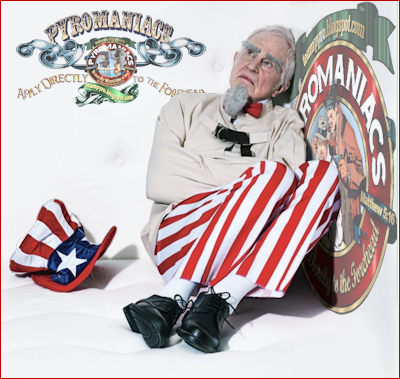
 few splenetic people (the kind who put the "Twit" in Twitter) have been relentlessly posting shrill criticisms of Grace Church's decision to stay open for congregational worship in spite of the California Governor's edicts ordering church doors closed. All the criticisms we get echo the same basic claims—namely, that the shutdown hasn't resulted in any actual "persecution" of churches, just inconvenience; that the Governor's orders don't really "target" churches, because they apply to sporting events and concerts as well; and that Grace Church would be perfectly free to meet and worship as a congregation if the elders would simply enforce the experts' guidelines for social distancing and keep everyone outdoors.
few splenetic people (the kind who put the "Twit" in Twitter) have been relentlessly posting shrill criticisms of Grace Church's decision to stay open for congregational worship in spite of the California Governor's edicts ordering church doors closed. All the criticisms we get echo the same basic claims—namely, that the shutdown hasn't resulted in any actual "persecution" of churches, just inconvenience; that the Governor's orders don't really "target" churches, because they apply to sporting events and concerts as well; and that Grace Church would be perfectly free to meet and worship as a congregation if the elders would simply enforce the experts' guidelines for social distancing and keep everyone outdoors.